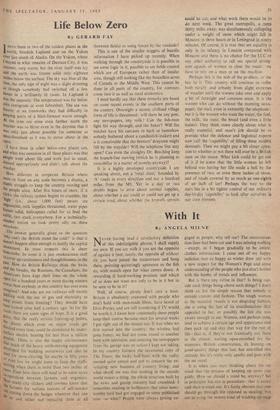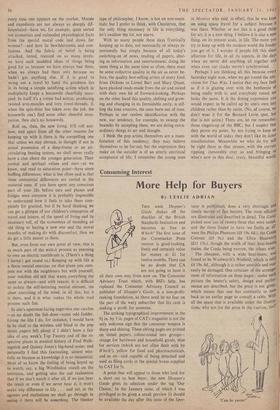With it
By ANGELA. NIILNE
NEVER having read a satisfactory definition 'of this indefatigable phrase, I shall supply my own. If you are with it you are the opposite of against it (not, surely, the opposite of without it); you have joined the mainstream and hang there, pointing quiveringly upstream as the fish do, with mouth open for what comes down. A rewarding if hard-working position, And which of us does not want not Only to be in it but to be seen to be in it? Well, of course, plenty don't care a hoot. Britain is absolutely crammed with people who don't hold with man-made fibres, have heard of Elvis Presley and are still wondering if TV would be worth it. I know how contentedly these people keep their course because once for several weeks I got right out of the stream too. It was when we first moved into the country; the wireless had gone funny, we had not come round to another bout with television, and ordering the newspapers from the garage was an action I kept not taking. In my country fastness the occasional, copy of The Times, the lucky half-hour with the radio, seemed quite unreal and not to concern the en- veloping new business of country living; and what shook me was that nothing in the outside world meant a thing, the whole structure built by the news and gossip industry had crumbled. I remember reading in bafflement that some news- worthy lord had got engaged to some publicised miss- so what? People were always getting en- gaged to people, why tell me? The communica- tion lines had been cut and I was missing nothing —except, as I began gradually to be aware, clothes information. I came out of my happy isolation (not so happy as winter drew on) with a new respect for the Woman's Page and some understanding of the people who just don't bother with the hooha of trends and influences.
But is there any virtue in that? Is being out- side such things being above such things? I don't think so, for the simple reason that nobody is outside custom and fashion. The tough woman in the mannish tweeds is not despising fashion, she is using the last of its manifestations that appealed to her, or possibly the last she was awake enough to see. Women, and perhaps men,. tend to achieve a certain age and appearance and- then pack up and stay that way for the rest of life—that is, if they're not frantically out there in the stream, waiting open-mouthed for the minnows. British conservatism, its leaning. on good-quality things that last, has sanctified this attitude, but its really only apathy and goes with the set mind.
It is when you start thinking about the set mind that the process of keeping up turns you giddy. How set should-a mind be, anyway? Set in principles but not in procedure—that is easier said than worked out. It's fairly obvious t hal one should go through life opposed to stealing. ifot not to using the newest kind of washing-up mop
every time one appears on the market. Morals and expedients are not always so sharply dif- ferentiated—have we, for example, quite sorted out economics and outmoded physiological facts from the special moral code laid down for women?—and here lie bewilderments and con- fusions. And the fabric of belief is being attacked, tested, restated on so many levels; we have such muddled ideas of things being good for us because we have always had them, when we always had them only because we hadn't got anything else. If it is good to wring out a towel by hand the goodness lies in its being a simple satisfying action which in multiplicity keeps a housewife cheerfully occu- pied. In itself it's a rotten bad action; producing twisted arm-muscles and torn towel-threads; if, when the spin-drier has taken over the job, the housewife can't find some other cheerful occu- pation, then she's no housewife.
Roll on, then, the new living. It'll roll any- how, and apart from all the other reasons for keeping up with it there is the compelling one that unless we stay abreast, in thought if not in actual possession of a deep-freeze or an air- circulating heating system, we shall never really have a clue about the younger generation. Their mental and spiritual values and ours—as we know, and read to saturation point—have some baffling differences; what is less often said is that these unmaterial differences are rooted in the material ones. If you have spent any conscious part of your life before cars and planes and fridges were common it is probably impossible to understand how it feels to take them com- pletely for granted; but if by hard thinking we can get a glimpse of our children's conception of travel and leisure, of the speed of living and its necessary toil, of the economics of mending an old thing or buying a new one and the moral benefits of making do with discomfort, then we do get a little nearer to them.
But, even from our own point of view, this is as much part of the with-it process as yearning to own an electric toothbrush is. (There's a thing I haven't got round to.) Keeping up with life is a fierce mental exercise; on that plane you com- pete not with the neighbours but with yourself, your indolent old self that wants everything the same as always—and with reason. It is difficult to isolate the self-bettering mental element, the sheer exercising of the mind, in all this; but it is there, and it is what makes the whole mad process such fun.
In one's upstream-facing eagerness one catches —as no doubt the fish does—some odd fodder. Living the life I do, for instance, I would have to be deaf to the wireless and blind to the pop music papers left about if I didn't have a fair idea of any week's Top Twenty and of the re- spective places in musical history of Fred Walk- ingstick and Quincy Jones's big-band noise; and personally I find this fascinating, almost wist- fully so because as knowledge it is so inessential. Most of us know the feeling of being keyed up to watch, say, a big Wimbledon match on the television, and getting also the sad realisation that if we don't watch it after all, if we just hear the result or even if we never hear it, it won't make any difference to life . . . and yet, in the agonies and exaltations we shall go through in seeing it there will be something. The bleaker type of philosopher, I know, is hot on non-essen- tials; but I prefer to think, with Chesterton, that the only thing necessary in life is everything; let's swallow the lot, not starve.
With -so many people these days frantically keeping up to date, not necessarily or always in- tentionally but simply because of all today's switching-on of news, reading of papers, shar- ing in information and entertainment, doing the same thing at the same time so often, there must be some collective quality in the air as never be- fore, the quality best-selling artists of every kind, from Dickens to Lionel Bart and Mary Quant, have plucked ready-made from the air and mixed with their own bit of forward-looking. Perhaps on the other hand this quality, shifting and grow- ing and changing in its formidable unity, is stif- ling the lone creators, the ones born out of time. Perhaps in our restless identification with the new, our tendency, for example, to swamp the beatniks by accepting them, we are doing extra- ordinary things to art and thought.
I think the pop artists themselves are a mani- festation of this tendency; they may believe themselves to be far-out, but the impression they make on the outsider is of an utterly uncritical acceptance of life. I remember the young man in Monitor who said, in effect, that he was keen on using space travel for a subject because if was there. Whether or not this is a good thing for art, it is a new thing. I believe it is also a new thing, on its present scale, in life. The more you try to keep up with the modern world the fonder you get of it. I wonder if people felt this sheer affection for life, in all its aspects, in the daYs when we never did anything all together and when even our clocks weren't synchronised.
Perhaps I am thinking all this because every Saturday night now, when we get round the tele' vision for That Was, I notice that my face feels as if it is glazing over with the bonhomie of being really with it; and everybody round me looks the same. It is the doting expression you would expect to be called up by one's own tiny children rather than by satire. (No, of course, we don't wear it -for the Bernard Levin spot, but that is not satire.) There are, let me remember, those ringers-up of the BBC; but I suspect that they prove my point; by not trying to keep UP with the world of today they don't like its latest manifestation. Meanwhile we who do try will be right there in that stream, with the current rippling inexorably over us and bringing US what's new in this dear, crazy, beautiful world.































 Previous page
Previous page